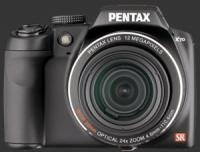Pentax Optio X70 Review
Pentax Optio X70 Usability - How easy is it to use?
The Pentax Optio X70 is quite easy to handle and just as easy to operate. Its body is well built and features a good hand-grip to hold it steady. It feels sturdy enough.
The main controls are easy to use with positive click points. The shutter-release is good with a noticeable halfway point used to focus the camera before taking a picture. The X70 has one command dial which is set on the camera's rear right under the thumb. This is the only control that feels sticky and slow to use. It is used for zooming in playback mode, making this operation very slow compared to similar cameras.
The tethered lens-cap easily stays with the camera. It falls off automatically when the X70 is powered on with it in place. Underneath the X70, a plastic tripod mount is placed at the camera's physical center. It is better for panoramas if the tripod mount is aligned with the lens' center but for other uses the physical center gives more balance.
The X70 is powered on by a simple button on top of the camera, behind the shutter-release. The zoom control is wrapped around the shutter. Zooming is quite fast but too sensitive for precise control over such a range. The top of the camera also holds the mode dial. The usual Auto, Program, Shutter-Priority, Aperture-Priority, Manual and Movie mode are present. Additionally, there are modes for digital shake reduction, sports and user settings. User settings are saved from another mode using the Record menu.
The mode dial also has a Scene-Mode which puts all individual scene modes under one mode. The specific Scene-Mode is chosen by calling up the Mode button using the down direction of the 4-way controller.

Continuous drive always shoots at 5 megapixels. The high-speed setting captures up to 21 images at 11 FPS. The medium-speed one takes up to 7 images at 6.3 FPS and the low-speed one takes up to 7 images at 4 FPS.
The Pentax Optio X70 has two great usability features: memory settings and a customizable green-button. The memory settings allow to specify which setting the X70 remembers after being powered-off. This is excellent to avoid taking pictures with the wrong exposure, white-balance or ISO, after having changed those settings the day before. The green button allows quick access to up to four settings of the user's choosing.
As most ultra-zooms, this digital camera features a large rear LCD and a small EVF. The EVF has a good protruding position. However, it is quite coarse, making judging details and focus nearly impossible. The LCD is better with great visibility.
Another problem with the LCD is that the preview isn't always accurate. The LCD is not exposure-priority in Manual mode and not in Aperture-priority or Shutter-priority when parameters are out of range. This is really too bad as you do not see the effects of being beyond the camera's exposure range.

The camera has a button to switch between EVF and LCD which is separate from the display mode button. The display mode button cycles through the image-only, information, information plus histogram and alignment grid modes which does not show any other information.
 On the camera's rear, a standard 4-way controller is used to navigate menus and as a short-cut to some camera functions. Those functions are: flash-mode, drive-mode, focus mode and scene-mode. Unlike similar cameras, exposure-compensation is controlled by a dedicated button behind the shutter-release.
On the camera's rear, a standard 4-way controller is used to navigate menus and as a short-cut to some camera functions. Those functions are: flash-mode, drive-mode, focus mode and scene-mode. Unlike similar cameras, exposure-compensation is controlled by a dedicated button behind the shutter-release.
While ISO and white-balance do not have dedicated buttons, the green button can be configured to invoke these settings. The menus are easy to navigate. This camera is shooting-priority, so a halfway press of the shutter brings it back to the set shooting mode. There is a playback button which toggles playback mode. The X70 cannot enter playback mode without extending its lens by holding the playback button.
ISO is selectable between 50 and 6400. Up to 1600, the camera can shoot at its maximum resolution of 12 megapixels. From 3200 onwards, the X70 limits itself to 5 megapixels which is normally enough for an 8"x10" print and for displaying full-screen on most computer displays. Because the usable ISO range depends on the photographic medium, it is great when a camera like the X70 allows the Auto ISO range to be selected. The minimum ISO is fixed at 50 with highlight-correction off and 100 with it on. The maximum ISO can be selected between 200, 400, 800 and 1600.
This ultra-zoom allows for -2 to +2 stops of exposure compensation and flash compensation, both in 1/3 stop increments. Exposure bracketing, which always takes 3 frames, can be set in increments from 1/3 to 2 EVs, in 1/3 stop increments.
 |
Please Support Neocamera
All information on Neocamera is provided free of charge yet running this website is a huge endeavor. Purchases made via affiliate links found throughout the site help keep it running and up-to-date. There is no additional cost to you, so please consider buying via these links to our affilates:
If you found any information on this site valuable and did not purchase via our affiliate links, please considering donating via PayPal:
Any amount will be greatly appreaciated. Thank you for your support!
Pentax X70 Highlights

Sensor-Size: 6 x 5mm

Actual size when viewed at 100 DPI
| 12 Megapixels Ultra Zoom | ISO 50-1600 |
| 24X Wide Optical Zoom | Shutter 1/4000-4s |
| Built-in Stabilization | Full manual controls, including Manual Focus |
| 0.20" Built-in EVF 200K Pixels | Custom white-balance |
| 1.2 FPS Drive, 6 Images | Spot-Metering |
| 1280x720 @ 30 FPS Video Recording | Lithium-Ion Battery |
| 2.7" LCD 230K Pixels | Secure Digital High Capacity |
Updates
2024.11.18

Best 2024 Photography Gifts for Every Budget
Great gifts for photographers and photo enthusiasts selected for every budget among the best products of 2024.
2024.08.07

Eye Protection Tips for Professional Photographers
The four main considerations for professional photographers regarding eyewear.
2024.07.14

Fujifilm X100VI Review
Flagship fixed-lens compact digital camera with a 40 MP sensor and Image-Stabilization, a first for the series. Retro design featuring dual control-dials, plus direct ISO, Shutter-Speed and EC dials. Its hybrid viewfinder can switch between EVF and OVF mode.
2024.05.09

Fujifilm GFX100 II Review
Flagship 102 Megapixels Medium-Format Mirrorless Digital Camera with 8-Stop 5-Axis IBIS, 8 FPS Drive, 8K Video and 400 MP Super-Resolution capture in a weatherproof and freezeproof body with dual control-dials and dual memory-card slots.
2024.04.03

Fujifilm X-T5 Review
Newest Fujifilm flagship boasting a 40 MP APS-C sensor, 5-axis IBIS with 7-stop efficiency, 15 FPS continuous drive, 6.2K Video capture, dual control-dials and dual SDXC UHS-II slots in a sturdy weatherproof and freezeproof body.
2023.11.20

Best Digital Cameras of 2023
Find out which are the Best Digital Cameras of 2023. All the new Mirrorless Digital Cameras from entry-level to high-end professional.
2023.07.10

Fujifilm X-H2 Review
40 Megapixels APS-C Hybrid Mirrorless Digital Camera with 7-stop IBIS. Fastest shutter ever and 8K video capture. Large builtin EVF with 0.8X magnification and 5.8 MP, plus an Eye-Start Sensor. Packed with features and large number of controls in a weatherproof and freezeproof body.
2023.05.07

Sony FE 20-70mm F/4G Review
Review of the unique Sony FE 20-70mm F/4G lens. The optical zoom of this lens spans ultra-wide-angle and medium focal-length coverage, making it one of the most versatile Full-Frame lenses on the market.
2023.01.15

Huion Inspiroy Dial 2 Review
Review of the Huion Inspiroy Dial 2 tablet, a medium sized drawing surface with dual dials and customizable buttons. Connects via USB-C or Bluetooth 5.0 with Windows, Linux and Android support.
2022.12.08

How to Pack for a Photo Trip
Find out how to pack for a travel photography trip, carry your gear safely while meeting airline regulations.
2022.11.13

Best Digital Cameras of 2022
The best digital cameras of 2022. A short list of the most outstanding models in their respective categories. Choose one for yourself or as a gift.
2022.09.21

Pentax DA* 60-250mm F/4 SDM Review
Review of the Pentax DA* 60-250mm F/4 SDM, the constant-aperture telephoto zoom with the highest zoom-ratio on the market.










